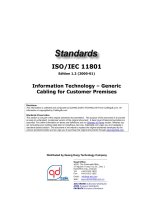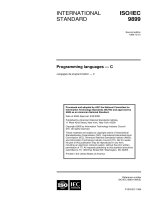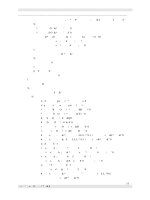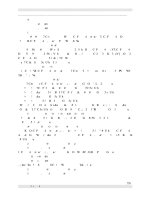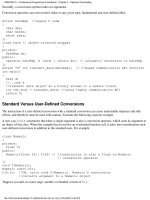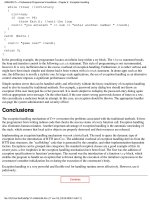International standard ansi iso iec 14882 1998 (c++ standard)
Bạn đang xem bản rút gọn của tài liệu. Xem và tải ngay bản đầy đủ của tài liệu tại đây (1.98 MB, 776 trang )
B
C
Reference numbe
r
ISO/IEC 14882:1998(E)
INTERNATIONAL
STANDARD
ISO/IEC
14882
First edition
1998-09-01
Programming languages — C++
Langages de programmation — C++
Processed and adopted by ASC X3 and approved by ANSI
as an American National Standard.
Date of ANSI Approval: 7/27/98
Published by American National Standards Institute,
11 West 42nd Street, New York, New York 10036
Copyright 1998 by Information Technology Industry Council
(ITI). All rights reserved.
These materials are subject to copyright claims of International
Standardization Organization (ISO), International
Electrotechnical Commission (IEC), American National
Standards Institute (ANSI), and Information Technology
Industry Council (ITI). Not for resale. No part of this
publication may be reproduced in any form, including an
electronic retrieval system, without the prior written permission
of ITI. All requests pertaining to this standard should be
submitted to ITI, 1250 Eye Street NW, Washington, DC 20005.
Printed in the United States of America
ISO/IEC 14882:1998(E)
© ISO/IEC 1998
All rights reserved. Unless otherwise specified, no part of this publication may be reproduced or utilized in any form or by any
means, electronic or mechanical, including photocopying and microfilm, without permission in writing from the publisher.
ISO/IEC Copyright Office • Case postale 56 • CH-1211 Genève 20 • Switzerland
Printed in Switzerland
ii
Contents
1 General 1
1.1 Scope 1
1.2 Normative references 1
1.3 Definitions 1
1.3.1 argument 1
1.3.2 diagnostic message 2
1.3.3 dynamic type 2
1.3.4 ill-formed program 2
1.3.5 implementation-defined behavior 2
1.3.6 implementation limits 2
1.3.7 locale-specific behavior 2
1.3.8 multibyte character 2
1.3.9 parameter 2
1.3.10 signature 2
1.3.11 static type 2
1.3.12 undefined behavior 2
1.3.13 unspecificed behavior 3
1.3.14 well-formed program 3
1.4 Implementation compliance 3
1.5 Structure of this International Standard 4
1.6 Syntax notation 4
1.7 The C++ memory model 4
1.8 The C++ object model
1.9 Program execution 5
© ISO/IEC ISO/IEC 14882:1998(E)
1.10 Acknowledgments 8
2 Lexical conventions 9
2.1 Phases of translation 9
2.2 Character sets 10
2.3 Trigraph sequences 11
2.4 Preprocessing tokens 11
2.5 Alternative tokens 12
2.6 Tokens 12
2.7 Comments 12
2.8 Header names 13
2.9 Preprocessing numbers 13
2.10 Identifiers 13
2.11 Keywords 14
2.12 Operators and punctuators 15
2.13 Literals 15
2.13.1 Integer literals 15
2.13.2 Character literals 16
2.13.3 Floating literals 18
2.13.4 String literals 19
2.13.5 Boolean literals 19
3 Basic concepts 21
3.1 Declarations and definitions 21
3.2 One definition rule 22
3.3 Declarative regions and scopes 24
3.3.1 Point of declaration 25
3.3.2 Local scope 26
3.3.3 Function prototype scope 26
3.3.4 Function scope 27
3.3.5 Namespace scope 27
3.3.6 Class scope 27
3.3.7 Name hiding 28
3.4 Name lookup 29
3.4.1 Unqualified name lookup 29
3.4.2 Argument-dependent name lookup 32
3.4.3 Qualified name lookup 33
iii
ISO/IEC 14882:1998(E) © ISO/IEC
3.4.3.1 Class members 35
3.4.3.2 Namespace members 35
3.4.4 Elaborated type specifiers 38
3.4.5 Class member access 39
3.4.6 Using-directives and namespace aliases 40
3.5 Program and linkage 41
3.6 Start and termination 43
3.6.1 Main function 43
3.6.2 Initialization of non-local objects 44
3.6.3 Termination 45
3.7 Storage duration 45
3.7.1 Static storage duration 46
3.7.2 Automatic storage duration 46
3.7.3 Dynamic storage duration 46
3.7.3.1 Allocation functions 47
3.7.3.2 Deallocation functions 47
3.7.4 Duration of sub-objects 48
3.8 Object Lifetime 48
3.9 Types 51
3.9.1 Fundamental types 53
3.9.2 Compound types 54
3.9.3 CV-qualifiers 55
3.10 Lvalues and rvalues 55
4 Standard conversions 57
4.1 Lvalue-to-rvalue conversion 57
4.2 Array-to-pointer conversion 58
4.3 Function-to-pointer conversion 58
4.4 Qualification conversions 58
4.5 Integral promotions 59
4.6 Floating point promotion 59
4.7 Integral conversions 60
4.8 Floating point conversions 60
4.9 Floating-integral conversions 60
4.10 Pointer conversions 60
4.11 Pointer to member conversions 61
iv
© ISO/IEC ISO/IEC 14882:1998(E)
4.12 Boolean conversions 61
5 Expressions 63
5.1 Primary expressions 64
5.2 Postfix expressions 66
5.2.1 Subscripting 66
5.2.2 Function call 66
5.2.3 Explicit type conversion (functional notation) 68
5.2.4 Pseudo destructor call 68
5.2.5 Class member access 68
5.2.6 Increment and decrement 69
5.2.7 Dynamic cast 70
5.2.8 Type identification 71
5.2.9 Static cast 72
5.2.10 Reinterpret cast 73
5.2.11 Const cast 74
5.3 Unary expressions 76
5.3.1 Unary operators 76
5.3.2 Increment and decrement 77
5.3.3 Sizeof 77
5.3.4 New 78
5.3.5 Delete 81
5.4 Explicit type conversion (cast notation) 82
5.5 Pointer-to-member operators 83
5.6 Multiplicative operators 83
5.7 Additive operators 84
5.8 Shift operators 85
5.9 Relational operators 85
5.10 Equality operators 86
5.11 Bitwise AND operator 87
5.12 Bitwise exclusive OR operator 87
5.13 Bitwise inclusive OR operator 87
5.14 Logical AND operator 87
5.15 Logical OR operator 88
5.16 Conditional operator 88
5.17 Assignment operators 89
v
ISO/IEC 14882:1998(E) © ISO/IEC
5.18 Comma operator 90
5.19 Constant expressions 90
6 Statements 93
6.1 Labeled statement 93
6.2 Expression statement 93
6.3 Compound statement or block 93
6.4 Selection statements 94
6.4.1 The if statement 95
6.4.2 The switch statement 95
6.5 Iteration statements 95
6.5.1 The while statement 96
6.5.2 The do statement 96
6.5.3 The for statement 97
6.6 Jump statements 97
6.6.1 The break statement 97
6.6.2 The continue statement 98
6.6.3 The return statement 98
6.6.4 The goto statement 98
6.7 Declaration statement 98
6.8 Ambiguity resolution 99
7 Declarations 101
7.1 Specifiers 102
7.1.1 Storage class specifiers 103
7.1.2 Function specifiers 104
7.1.3 The typedef specifier 105
7.1.4 The friend specifier 106
7.1.5 Type specifiers 106
7.1.5.1 The cv-qualifiers 107
7.1.5.2 Simple type specifiers 108
7.1.5.3 Elaborated type specifiers 109
7.2 Enumeration declarations 110
7.3 Namespaces 112
7.3.1 Namespace definition 112
7.3.1.1 Unnamed namespaces 113
7.3.1.2 Namespace member definitions 113
7.3.2 Namespace alias 115
7.3.3 The using declaration 115
7.3.4 Using directive 120
7.4 The asm declaration 123
vi
© ISO/IEC ISO/IEC 14882:1998(E)
7.5 Linkage specifications 123
8 Declarators 127
8.1 Type names 128
8.2 Ambiguity resolution 128
8.3 Meaning of declarators 130
8.3.1 Pointers 131
8.3.2 References 132
8.3.3 Pointers to members 133
8.3.4 Arrays 133
8.3.5 Functions 135
8.3.6 Default arguments 137
8.4 Function definitions 140
8.5 Initializers 141
8.5.1 Aggregates 144
8.5.2 Character arrays 146
8.5.3 References 147
9 Classes 149
9.1 Class names 149
9.2 Class members 151
9.3 Member functions 153
9.3.1 Nonstatic member functions 154
9.3.2 The this pointer 155
9.4 Static members 156
9.4.1 Static member functions 157
9.4.2 Static data members 157
9.5 Unions 158
9.6 Bit-fields 159
9.7 Nested class declarations 160
9.8 Local class declarations 161
9.9 Nested type names 161
10 Derived classes 163
10.1 Multiple base classes 164
10.2 Member name lookup 165
10.3 Virtual functions 168
vii
ISO/IEC 14882:1998(E) © ISO/IEC
10.4 Abstract classes 172
11 Member access control 175
11.1 Access specifiers 176
11.2 Accessibility of base classes and base class members 177
11.3 Access declarations 178
11.4 Friends 179
11.5 Protected member access 182
11.6 Access to virtual functions 183
11.7 Multiple access 183
11.8 Nested classes 184
12 Special member functions 185
12.1 Constructors 185
12.2 Temporary objects 187
12.3 Conversions 188
12.3.1 Conversion by constructor 189
12.3.2 Conversion functions 190
12.4 Destructors 191
12.5 Free store 194
12.6 Initialization 195
12.6.1 Explicit initialization 196
12.6.2 Initializing bases and members 197
12.7 Construction and destruction 200
12.8 Copying class objects 203
13 Overloading 209
13.1 Overloadable declarations 209
13.2 Declaration matching 211
13.3 Overload resolution 212
13.3.1 Candidate functions and argument lists 213
13.3.1.1 Function call syntax 214
13.3.1.1.1 Call to named function 214
13.3.1.1.2 Call to object of class type 215
13.3.1.2 Operators in expressions 216
viii
© ISO/IEC ISO/IEC 14882:1998(E)
13.3.1.3 Initialization by constructor 218
13.3.1.4 Copy-initialization of class by user-defined conversion 218
13.3.1.5 Initialization by conversion function 218
13.3.1.6 Initialization by conversion function for direct reference binding 219
13.3.2 Viable functions 219
13.3.3 Best Viable Function 219
13.3.3.1 Implicit conversion sequences 221
13.3.3.1.1 Standard conversion sequences 222
13.3.3.1.2 User-defined conversion sequences 223
13.3.3.1.3 Ellipsis conversion sequences 223
13.3.3.1.4 Reference binding 224
13.3.3.2 Ranking implicit conversion sequences 224
13.4 Address of overloaded function 226
13.5 Overloaded operators 227
13.5.1 Unary operators 228
13.5.2 Binary operators 229
13.5.3 Assignment 229
13.5.4 Function call 229
13.5.5 Subscripting 230
13.5.6 Class member access 230
13.5.7 Increment and decrement 230
13.6 Built-in operators 231
14 Templates 235
14.1 Template parameters 236
14.2 Names of template specializations 238
14.3 Template arguments 239
14.3.1 Template type arguments 241
14.3.2 Template non-type arguments 242
14.3.3 Template template arguments 243
14.4 Type equivalence 244
14.5 Template declarations 244
14.5.1 Class templates 244
14.5.1.1 Member functions of class templates 245
14.5.1.2 Member classes of class templates 246
14.5.1.3 Static data members of class templates 246
14.5.2 Member templates 246
14.5.3 Friends 248
14.5.4 Class template partial specializations 250
14.5.4.1 Matching of class template partial specializations 252
14.5.4.2 Partial ordering of class template specializations 252
14.5.4.3 Members of class template specializations 253
14.5.5 Function templates 254
14.5.5.1 Function template overloading 254
14.5.5.2 Partial ordering of function templates 256
ix
ISO/IEC 14882:1998(E) © ISO/IEC
14.6 Name resolution 257
14.6.1 Locally declared names 260
14.6.2 Dependent names 262
14.6.2.1 Dependent types 263
14.6.2.2 Type-dependent expressions 263
14.6.2.3 Value-dependent expressions 264
14.6.2.4 Dependent template arguments 264
14.6.3 Non-dependent names 265
14.6.4 Dependent name resolution 265
14.6.4.1 Point of instantiation 265
14.6.4.2 Candidate functions 266
14.6.5 Friend names declared within a class template 266
14.7 Template instantiation and specialization 267
14.7.1 Implicit instantiation 268
14.7.2 Explicit instantiation 271
14.7.3 Explicit specialization 272
14.8 Function template specializations 277
14.8.1 Explicit template argument specification 278
14.8.2 Template argument deduction 280
14.8.2.1 Deducing template arguments from a function call 282
14.8.2.2 Deducing template arguments taking the address of a function template 283
14.8.2.3 Deducing conversion function template arguments 283
14.8.2.4 Deducing template arguments from a type 283
14.8.3 Overload resolution 288
15 Exception handling 291
15.1 Throwing an exception 292
15.2 Constructors and destructors 294
15.3 Handling an exception 294
15.4 Exception specifications 296
15.5 Special functions 298
15.5.1 The terminate() function 298
15.5.2 The unexpected() function 299
15.5.3 The uncaught_exception() function 299
15.6 Exceptions and access 299
16 Preprocessing directives 301
16.1 Conditional inclusion 302
16.2 Source file inclusion 303
16.3 Macro replacement 304
16.3.1 Argument substitution 305
16.3.2 The # operator 305
16.3.3 The ## operator 306
x
© ISO/IEC ISO/IEC 14882:1998(E)
16.3.4 Rescanning and further replacement 306
16.3.5 Scope of macro definitions 306
16.4 Line control 308
16.5 Error directive 308
16.6 Pragma directive 308
16.7 Null directive 308
16.8 Predefined macro names 309
17 Library introduction 311
17.1 Definitions 311
17.1.1 arbitrary-positional stream 311
17.1.2 character 311
17.1.3 character container type 311
17.1.4 comparison function 311
17.1.5 component 312
17.1.6 default behavior 312
17.1.7 handler function 312
17.1.8 iostream class templates 312
17.1.9 modifier function 312
17.1.10 object state 312
17.1.11 narrow-oriented iostream classes 312
17.1.12 NTCTS 312
17.1.13 observer function 312
17.1.14 replacement function 312
17.1.15 required behavior 312
17.1.16 repositional stream 313
17.1.17 reserved function 313
17.1.18 traits class 313
17.1.19 wide-oriented iostream classes 313
17.2 Additional definitions 313
17.3 Method of description (Informative) 313
17.3.1 Structure of each subclause 313
17.3.1.1 Summary 314
17.3.1.2 Requirements 314
17.3.1.3 Specifications 314
17.3.1.4 C Library 315
17.3.2 Other conventions 315
17.3.2.1 Type descriptions 315
17.3.2.1.1 Enumerated types 316
17.3.2.1.2 Bitmask types 316
17.3.2.1.3 Character sequences 317
17.3.2.1.3.1 Byte strings 317
17.3.2.1.3.2 Multibyte strings 318
17.3.2.1.3.3 Wide-character sequences 318
17.3.2.2 Functions within classes 318
17.3.2.3 Private members 318
xi
ISO/IEC 14882:1998(E) © ISO/IEC
17.4 Library-wide requirements 318
17.4.1 Library contents and organization 319
17.4.1.1 Library contents 319
17.4.1.2 Headers 319
17.4.1.3 Freestanding implementations 320
17.4.2 Using the library 320
17.4.2.1 Headers 320
17.4.2.2 Linkage 321
17.4.3 Constraints on programs 321
17.4.3.1 Reserved names 321
17.4.3.1.1 Macro names 321
17.4.3.1.2 Global names 321
17.4.3.1.3 External linkage 322
17.4.3.1.4 Types 322
17.4.3.2 Headers 322
17.4.3.3 Derived classes 322
17.4.3.4 Replacement functions 322
17.4.3.5 Handler functions 323
17.4.3.6 Other functions 323
17.4.3.7 Function arguments 324
17.4.3.8 Required paragraph 324
17.4.4 Conforming implementations 324
17.4.4.1 Headers 324
17.4.4.2 Restrictions on macro definitions 324
17.4.4.3 Global functions 324
17.4.4.4 Member functions 325
17.4.4.5 Reentrancy 325
17.4.4.6 Protection within classes 325
17.4.4.7 Derived classes 325
17.4.4.8 Restrictions on exception handling 325
18 Language support library 327
18.1 Types 327
18.2 Implementation properties 328
18.2.1 Numeric limits 328
18.2.1.1 Template class numeric_limits 328
18.2.1.2 numeric_limits members 329
18.2.1.3 Type float_round_style 333
18.2.1.4 Type float_denorm_style 334
18.2.1.5 numeric_limits specializations 334
18.2.2 C Library 335
18.3 Start and termination 336
18.4 Dynamic memory management 337
18.4.1 Storage allocation and deallocation 337
18.4.1.1 Single-object forms 337
18.4.1.2 Array forms 338
18.4.1.3 Placement forms 339
18.4.2 Storage allocation errors 340
18.4.2.1 Class bad_alloc 340
18.4.2.2 Type new_handler 340
xii
© ISO/IEC ISO/IEC 14882:1998(E)
18.4.2.3 set_new_handler 341
18.5 Type identification 341
18.5.1 Class type_info 341
18.5.2 Class bad_cast 342
18.5.3 Class bad_typeid 342
18.6 Exception handling 343
18.6.1 Class exception 343
18.6.2 Violating
exception-specifications
344
18.6.2.1 Class bad_exception 344
18.6.2.2 Type unexpected_handler 345
18.6.2.3 set_unexpected 345
18.6.2.4 unexpected 345
18.6.3 Abnormal termination 345
18.6.3.1 Type terminate_handler 345
18.6.3.2 set_terminate 345
18.6.3.3 terminate 345
18.6.4 uncaught_exception 346
18.7 Other runtime support 346
19 Diagnostics library 349
19.1 Exception classes 349
19.1.1 Class logic_error 349
19.1.2 Class domain_error 350
19.1.3 Class invalid_argument 350
19.1.4 Class length_error 350
19.1.5 Class out_of_range 351
19.1.6 Class runtime_error 351
19.1.7 Class range_error 351
19.1.8 Class overflow_error 351
19.1.9 Class underflow_error 352
19.2 Assertions 352
19.3 Error numbers 352
20 General utilities library 353
20.1 Requirements 353
20.1.1 Equality comparison 353
20.1.2 Less than comparison 353
20.1.3 Copy construction 354
20.1.4 Default construction 354
20.1.5 Allocator requirements 354
20.2 Utility components 357
20.2.1 Operators 357
20.2.2 Pairs 358
20.3 Function objects 359
20.3.1 Base 361
xiii
ISO/IEC 14882:1998(E) © ISO/IEC
20.3.2 Arithmetic operations 361
20.3.3 Comparisons 362
20.3.4 Logical operations 363
20.3.5 Negators 363
20.3.6 Binders 364
20.3.6.1 Template class binder1st 364
20.3.6.2 bind1st 364
20.3.6.3 Template class binder2nd 364
20.3.6.4 bind2nd 365
20.3.7 Adaptors for pointers to functions 365
20.3.8 Adaptors for pointers to members 366
20.4 Memory 368
20.4.1 The default allocator 368
20.4.1.1 allocator members 369
20.4.1.2 allocator globals 370
20.4.2 Raw storage iterator 370
20.4.3 Temporary buffers 371
20.4.4 Specialized algorithms 371
20.4.4.1 uninitialized_copy 371
20.4.4.2 uninitialized_fill 372
20.4.4.3 uninitialized_fill_n 372
20.4.5 Template class auto_ptr 372
20.4.5.1 auto_ptr constructors 373
20.4.5.2 auto_ptr members 373
20.4.5.3 auto_ptr conversions 374
20.4.6 C Library 374
20.5 Date and time 375
21 Strings library 377
21.1 Character traits 377
21.1.1 Character traits requirements 377
21.1.2 traits typedefs 379
21.1.3 char_traits specializations 379
21.1.3.1 struct char_traits<char> 379
21.1.3.2 struct char_traits<wchar_t> 380
21.2 String classes 381
21.3 Template class basic_string 383
21.3.1 basic_string constructors 387
21.3.2 basic_string iterator support 390
21.3.3 basic_string capacity 390
21.3.4 basic_string element access 391
21.3.5 basic_string modifiers 392
21.3.5.1 basic_string::operator+= 392
21.3.5.2 basic_string::append 392
21.3.5.3 basic_string::assign 393
21.3.5.4 basic_string::insert 393
21.3.5.5 basic_string::erase 394
21.3.5.6 basic_string::replace 395
21.3.5.7 basic_string::copy 396
xiv
© ISO/IEC ISO/IEC 14882:1998(E)
21.3.5.8 basic_string::swap 397
21.3.6 basic_string string operations 397
21.3.6.1 basic_string::find 397
21.3.6.2 basic_string::rfind 398
21.3.6.3 basic_string::find_first_of 398
21.3.6.4 basic_string::find_last_of 399
21.3.6.5 basic_string::find_first_not_of 399
21.3.6.6 basic_string::find_last_not_of 400
21.3.6.7 basic_string::substr 400
21.3.6.8 basic_string::compare 400
21.3.7 basic_string non-member functions 401
21.3.7.1 operator+ 401
21.3.7.2 operator== 402
21.3.7.3 operator!= 402
21.3.7.4 operator< 403
21.3.7.5 operator> 403
21.3.7.6 operator<= 403
21.3.7.7 operator>= 404
21.3.7.8 swap 404
21.3.7.9 Inserters and extractors 404
21.4 Null-terminated sequence utilities 405
22 Localization library 409
22.1 Locales 409
22.1.1 Class locale 410
22.1.1.1 locale types 412
22.1.1.1.1 Type locale::category 412
22.1.1.1.2 Class locale::facet 414
22.1.1.1.3 Class locale::id 414
22.1.1.2 locale constructors and destructor 415
22.1.1.3 locale members 416
22.1.1.4 locale operators 416
22.1.1.5 locale static members 416
22.1.2 locale globals 417
22.1.3 Convenience interfaces 417
22.1.3.1 Character classification 417
22.1.3.2 Character conversions 417
22.2 Standard locale categories 418
22.2.1 The ctype category 418
22.2.1.1 Template class ctype 418
22.2.1.1.1 ctype members 419
22.2.1.1.2 ctype virtual functions 420
22.2.1.2 Template class ctype_byname 421
22.2.1.3 ctype specializations 422
22.2.1.3.1 ctype<char> destructor 423
22.2.1.3.2 ctype<char> members 423
22.2.1.3.3 ctype<char> static members 424
22.2.1.3.4 ctype<char> virtual functions 424
22.2.1.4 Class ctype_byname<char> 425
22.2.1.5 Template class codecvt 425
22.2.1.5.1 codecvt members 426
xv
ISO/IEC 14882:1998(E) © ISO/IEC
22.2.1.5.2 codecvt virtual functions 427
22.2.1.6 Template class codecvt_byname 429
22.2.2 The numeric category 429
22.2.2.1 Template class num_get 429
22.2.2.1.1 num_get members 431
22.2.2.1.2 num_get virtual functions 431
22.2.2.2 Template class num_put 433
22.2.2.2.1 num_put members 434
22.2.2.2.2 num_put virtual functions 434
22.2.3 The numeric punctuation facet 437
22.2.3.1 Template class numpunct 437
22.2.3.1.1 numpunct members 438
22.2.3.1.2 numpunct virtual functions 439
22.2.3.2 Template class numpunct_byname 439
22.2.4 The collate category 439
22.2.4.1 Template class collate 439
22.2.4.1.1 collate members 440
22.2.4.1.2 collate virtual functions 440
22.2.4.2 Template class collate_byname 441
22.2.5 The time category 441
22.2.5.1 Template class time_get 441
22.2.5.1.1 time_get members 442
22.2.5.1.2 time_get virtual functions 443
22.2.5.2 Template class time_get_byname 444
22.2.5.3 Template class time_put 444
22.2.5.3.1 time_put members 445
22.2.5.3.2 time_put virtual functions 445
22.2.5.4 Template class time_put_byname 445
22.2.6 The monetary category 446
22.2.6.1 Template class money_get 446
22.2.6.1.1 money_get members 446
22.2.6.1.2 money_get virtual functions 446
22.2.6.2 Template class money_put 448
22.2.6.2.1 money_put members 448
22.2.6.2.2 money_put virtual functions 448
22.2.6.3 Template class moneypunct 449
22.2.6.3.1 moneypunct members 450
22.2.6.3.2 moneypunct virtual functions 450
22.2.6.4 Template class moneypunct_byname 451
22.2.7 The message retrieval category 452
22.2.7.1 Template class messages 452
22.2.7.1.1 messages members 452
22.2.7.1.2 messages virtual functions 453
22.2.7.2 Template class messages_byname 453
22.2.8 Program-defined facets 453
22.3 C Library Locales 457
23 Containers library 459
23.1 Container requirements 459
23.1.1 Sequences 462
23.1.2 Associative containers 464
xvi
© ISO/IEC ISO/IEC 14882:1998(E)
23.2 Sequences 467
23.2.1 Template class deque 470
23.2.1.1 deque constructors, copy, and assignment 472
23.2.1.2 deque capacity 473
23.2.1.3 deque modifiers 473
23.2.1.4 deque specialized algorithms 473
23.2.2 Template class list 474
23.2.2.1 list constructors, copy, and assignment 476
23.2.2.2 list capacity 477
23.2.2.3 list modifiers 477
23.2.2.4 list operations 477
23.2.2.5 list specialized algorithms 479
23.2.3 Container adaptors 479
23.2.3.1 Template class queue 479
23.2.3.2 Template class priority_queue 480
23.2.3.2.1 priority_queue constructors 481
23.2.3.2.2 priority_queue members 481
23.2.3.3 Template class stack 481
23.2.4 Template class vector 482
23.2.4.1 vector constructors, copy, and assignment 484
23.2.4.2 vector capacity 485
23.2.4.3 vector modifiers 485
23.2.4.4 vector specialized algorithms 486
23.2.5 Class vector<bool> 486
23.3 Associative containers 488
23.3.1 Template class map 490
23.3.1.1 map constructors, copy, and assignment 492
23.3.1.2 map element access 493
23.3.1.3 map operations 493
23.3.1.4 map specialized algorithms 493
23.3.2 Template class multimap 493
23.3.2.1 multimap constructors 496
23.3.2.2 multimap operations 496
23.3.2.3 multimap specialized algorithms 496
23.3.3 Template class set 496
23.3.3.1 set constructors, copy, and assignment 498
23.3.3.2 set specialized algorithms 499
23.3.4 Template class multiset 499
23.3.4.1 multiset constructors 501
23.3.4.2 multiset specialized algorithms 501
23.3.5 Template class bitset 502
23.3.5.1 bitset constructors 503
23.3.5.2 bitset members 504
23.3.5.3 bitset operators 506
24 Iterators library 509
24.1 Iterator requirements 509
24.1.1 Input iterators 510
24.1.2 Output iterators 511
24.1.3 Forward iterators 512
24.1.4 Bidirectional iterators 513
24.1.5 Random access iterators 513
xvii
ISO/IEC 14882:1998(E) © ISO/IEC
24.2 Header <iterator> synopsis 514
24.3 Iterator primitives 516
24.3.1 Iterator traits 516
24.3.2 Basic iterator 517
24.3.3 Standard iterator tags 518
24.3.4 Iterator operations 519
24.4 Predefined iterators 519
24.4.1 Reverse iterators 519
24.4.1.1 Template class reverse_iterator 520
24.4.1.2 reverse_iterator requirements 521
24.4.1.3 reverse_iterator operations 521
24.4.1.3.1 reverse_iterator constructor 521
24.4.1.3.2 Conversion 521
24.4.1.3.3 operator* 521
24.4.1.3.4 operator-> 522
24.4.1.3.5 operator++ 522
24.4.1.3.6 operator 522
24.4.1.3.7 operator+ 522
24.4.1.3.8 operator+= 522
24.4.1.3.9 operator 523
24.4.1.3.10 operator-= 523
24.4.1.3.11 operator[] 523
24.4.1.3.12 operator== 523
24.4.1.3.13 operator< 523
24.4.1.3.14 operator!= 523
24.4.1.3.15 operator> 523
24.4.1.3.16 operator>= 524
24.4.1.3.17 operator<= 524
24.4.1.3.18 operator 524
24.4.1.3.19 operator+ 524
24.4.2 Insert iterators 524
24.4.2.1 Template class back_insert_iterator 525
24.4.2.2 back_insert_iterator operations 525
24.4.2.2.1 back_insert_iterator constructor 525
24.4.2.2.2 back_insert_iterator::operator= 525
24.4.2.2.3 back_insert_iterator::operator* 525
24.4.2.2.4 back_insert_iterator::operator++ 525
24.4.2.2.5 back_inserter 526
24.4.2.3 Template class front_insert_iterator 526
24.4.2.4 front_insert_iterator operations 526
24.4.2.4.1 front_insert_iterator constructor 526
24.4.2.4.2 front_insert_iterator::operator= 526
24.4.2.4.3 front_insert_iterator::operator* 526
24.4.2.4.4 front_insert_iterator::operator++ 527
24.4.2.4.5 front_inserter 527
24.4.2.5 Template class insert_iterator 527
24.4.2.6 insert_iterator operations 527
24.4.2.6.1 insert_iterator constructor 527
24.4.2.6.2 insert_iterator::operator= 527
24.4.2.6.3 insert_iterator::operator* 528
24.4.2.6.4 insert_iterator::operator++ 528
24.4.2.6.5 inserter 528
xviii
© ISO/IEC ISO/IEC 14882:1998(E)
24.5 Stream iterators 528
24.5.1 Template class istream_iterator 528
24.5.1.1 istream_iterator constructors and destructor 529
24.5.1.2 istream_iterator operations 529
24.5.2 Template class ostream_iterator 530
24.5.2.1 ostream_iterator constructors and destructor 531
24.5.2.2 ostream_iterator operations 531
24.5.3 Template class istreambuf_iterator 531
24.5.3.1 Template class istreambuf_iterator::proxy 532
24.5.3.2 istreambuf_iterator constructors 533
24.5.3.3 istreambuf_iterator::operator* 533
24.5.3.4 istreambuf_iterator::operator++ 533
24.5.3.5 istreambuf_iterator::equal 533
24.5.3.6 operator== 533
24.5.3.7 operator!= 534
24.5.4 Template class ostreambuf_iterator 534
24.5.4.1 ostreambuf_iterator constructors 534
24.5.4.2 ostreambuf_iterator operations 534
25 Algorithms library 537
25.1 Non-modifying sequence operations 545
25.1.1 For each 545
25.1.2 Find 546
25.1.3 Find End 546
25.1.4 Find First 546
25.1.5 Adjacent find 547
25.1.6 Count 547
25.1.7 Mismatch 547
25.1.8 Equal 548
25.1.9 Search 548
25.2 Mutating sequence operations 549
25.2.1 Copy 549
25.2.2 Swap 549
25.2.3 Transform 550
25.2.4 Replace 550
25.2.5 Fill 551
25.2.6 Generate 551
25.2.7 Remove 551
25.2.8 Unique 552
25.2.9 Reverse 552
25.2.10 Rotate 553
25.2.11 Random shuffle 553
25.2.12 Partitions 554
25.3 Sorting and related operations 554
25.3.1 Sorting 555
25.3.1.1 sort 555
25.3.1.2 stable_sort 555
25.3.1.3 partial_sort 555
25.3.1.4 partial_sort_copy 556
25.3.2 Nth element 556
25.3.3 Binary search 556
xix
ISO/IEC 14882:1998(E) © ISO/IEC
25.3.3.1 lower_bound 556
25.3.3.2 upper_bound 557
25.3.3.3 equal_range 557
25.3.3.4 binary_search 557
25.3.4 Merge 558
25.3.5 Set operations on sorted structures 558
25.3.5.1 includes 559
25.3.5.2 set_union 559
25.3.5.3 set_intersection 559
25.3.5.4 set_difference 560
25.3.5.5 set_symmetric_difference 560
25.3.6 Heap operations 560
25.3.6.1 push_heap 561
25.3.6.2 pop_heap 561
25.3.6.3 make_heap 561
25.3.6.4 sort_heap 561
25.3.7 Minimum and maximum 562
25.3.8 Lexicographical comparison 562
25.3.9 Permutation generators 563
25.4 C library algorithms 563
26 Numerics library 565
26.1 Numeric type requirements 565
26.2 Complex numbers 566
26.2.1 Header <complex> synopsis 566
26.2.2 Template class complex 567
26.2.3 complex specializations 569
26.2.4 complex member functions 570
26.2.5 complex member operators 570
26.2.6 complex non-member operations 571
26.2.7 complex value operations 572
26.2.8 complex transcendentals 573
26.3 Numeric arrays 574
26.3.1 Header <valarray> synopsis 574
26.3.2 Template class valarray 577
26.3.2.1 valarray constructors 578
26.3.2.2 valarray assignment 579
26.3.2.3 valarray element access 580
26.3.2.4 valarray subset operations 580
26.3.2.5 valarray unary operators 580
26.3.2.6 valarray computed assignment 581
26.3.2.7 valarray member functions 581
26.3.3 valarray non-member operations 583
26.3.3.1 valarray binary operators 583
26.3.3.2 valarray logical operators 584
26.3.3.3 valarray transcendentals 585
26.3.4 Class slice 585
26.3.4.1 slice constructors 585
26.3.4.2 slice access functions 586
26.3.5 Template class slice_array 586
xx
© ISO/IEC ISO/IEC 14882:1998(E)
26.3.5.1 slice_array constructors 587
26.3.5.2 slice_array assignment 587
26.3.5.3 slice_array computed assignment 587
26.3.5.4 slice_array fill function 587
26.3.6 The gslice class 587
26.3.6.1 gslice constructors 588
26.3.6.2 gslice access functions 589
26.3.7 Template class gslice_array 589
26.3.7.1 gslice_array constructors 589
26.3.7.2 gslice_array assignment 590
26.3.7.3 gslice_array computed assignment 590
26.3.7.4 gslice_array fill function 590
26.3.8 Template class mask_array 590
26.3.8.1 mask_array constructors 591
26.3.8.2 mask_array assignment 591
26.3.8.3 mask_array computed assignment 591
26.3.8.4 mask_array fill function 592
26.3.9 Template class indirect_array 592
26.3.9.1 indirect_array constructors 592
26.3.9.2 indirect_array assignment 593
26.3.9.3 indirect_array computed assignment 593
26.3.9.4 indirect_array fill function 593
26.4 Generalized numeric operations 593
26.4.1 Accumulate 594
26.4.2 Inner product 595
26.4.3 Partial sum 595
26.4.4 Adjacent difference 595
26.5 C Library 596
27 Input/output library 599
27.1 Iostreams requirements 599
27.1.1 Imbue Limitations 599
27.1.2 Positioning Type Limitations 599
27.2 Forward declarations 599
27.3 Standard iostream objects 602
27.3.1 Narrow stream objects 602
27.3.2 Wide stream objects 603
27.4 Iostreams base classes 604
27.4.1 Types 604
27.4.2 Class ios_base 605
27.4.2.1 Types 607
27.4.2.1.1 Class ios_base::failure 607
27.4.2.1.2 Type ios_base::fmtflags 607
27.4.2.1.3 Type ios_base::iostate 608
27.4.2.1.4 Type ios_base::openmode 609
27.4.2.1.5 Type ios_base::seekdir 609
27.4.2.1.6 Class ios_base::Init 609
27.4.2.2 ios_base fmtflags state functions 610
xxi
ISO/IEC 14882:1998(E) © ISO/IEC
27.4.2.3 ios_base locale functions 611
27.4.2.4 ios_base static members 611
27.4.2.5 ios_base storage functions 611
27.4.2.6 ios_base callbacks 612
27.4.2.7 ios_base constructors/destructors 612
27.4.3 Template class fpos 612
27.4.3.1 fpos Members 612
27.4.3.2 fpos requirements 612
27.4.4 Template class basic_ios 613
27.4.4.1 basic_ios constructors 614
27.4.4.2 Member functions 615
27.4.4.3 basic_ios iostate flags functions 616
27.4.5 ios_base manipulators 617
27.4.5.1 fmtflags manipulators 617
27.4.5.2 adjustfield manipulators 618
27.4.5.3 basefield manipulators 619
27.4.5.4 floatfield manipulators 619
27.5 Stream buffers 619
27.5.1 Stream buffer requirements 620
27.5.2 Template class basic_streambuf<charT,traits> 620
27.5.2.1 basic_streambuf constructors 622
27.5.2.2 basic_streambuf public member functions 623
27.5.2.2.1 Locales 623
27.5.2.2.2 Buffer management and positioning 623
27.5.2.2.3 Get area 623
27.5.2.2.4 Putback 624
27.5.2.2.5 Put area 624
27.5.2.3 basic_streambuf protected member functions 624
27.5.2.3.1 Get area access 624
27.5.2.3.2 Put area access 625
27.5.2.4 basic_streambuf virtual functions 625
27.5.2.4.1 Locales 625
27.5.2.4.2 Buffer management and positioning 625
27.5.2.4.3 Get area 626
27.5.2.4.4 Putback 627
27.5.2.4.5 Put area 628
27.6 Formatting and manipulators 629
27.6.1 Input streams 630
27.6.1.1 Template class basic_istream 630
27.6.1.1.1 basic_istream constructors 632
27.6.1.1.2 Class basic_istream::sentry 632
27.6.1.2 Formatted input functions 633
27.6.1.2.1 Common requirements 633
27.6.1.2.2 Arithmetic Extractors 633
27.6.1.2.3 basic_istream::operator>> 634
27.6.1.3 Unformatted input functions 635
27.6.1.4 Standard basic_istream manipulators 639
27.6.1.5 Template class basic_iostream 639
27.6.1.5.1 basic_iostream constructors 640
27.6.1.5.2 basic_iostream destructor 640
27.6.2 Output streams 640
27.6.2.1 Template class basic_ostream 640
xxii
© ISO/IEC ISO/IEC 14882:1998(E)
27.6.2.2 basic_ostream constructors 642
27.6.2.3 Class basic_ostream::sentry 642
27.6.2.4 basic_ostream seek members 643
27.6.2.5 Formatted output functions 643
27.6.2.5.1 Common requirements 643
27.6.2.5.2 Arithmetic Inserters 643
27.6.2.5.3 basic_ostream::operator<< 644
27.6.2.5.4 Character inserter template functions 645
27.6.2.6 Unformatted output functions 645
27.6.2.7 Standard basic_ostream manipulators 646
27.6.3 Standard manipulators 646
27.7 String-based streams 648
27.7.1 Template class basic_stringbuf 649
27.7.1.1 basic_stringbuf constructors 650
27.7.1.2 Member functions 650
27.7.1.3 Overridden virtual functions 651
27.7.2 Template class basic_istringstream 653
27.7.2.1 basic_istringstream constructors 653
27.7.2.2 Member functions 654
27.7.3 Class basic_ostringstream 654
27.7.3.1 basic_ostringstream constructors 655
27.7.3.2 Member functions 655
27.7.4 Template class basic_stringstream 655
27.7.5 basic_stringstream constructors 656
27.7.6 Member functions 656
27.8 File-based streams 657
27.8.1 File streams 657
27.8.1.1 Template class basic_filebuf 657
27.8.1.2 basic_filebuf constructors 658
27.8.1.3 Member functions 659
27.8.1.4 Overridden virtual functions 660
27.8.1.5 Template class basic_ifstream 662
27.8.1.6 basic_ifstream constructors 663
27.8.1.7 Member functions 663
27.8.1.8 Template class basic_ofstream 664
27.8.1.9 basic_ofstream constructors 664
27.8.1.10 Member functions 665
27.8.1.11 Template class basic_fstream 665
27.8.1.12 basic_fstream constructors 666
27.8.1.13 Member functions 666
27.8.2 C Library files 666
Annex A (informative) Grammar summary 667
A.1 Keywords 667
A.2 Lexical conventions 667
A.3 Basic concepts 671
A.4 Expressions 671
xxiii
ISO/IEC 14882:1998(E) © ISO/IEC
A.5 Statements 674
A.6 Declarations 675
A.7 Declarators 677
A.8 Classes 679
A.9 Derived classes 680
A.10 Special member functions 680
A.11 Overloading 680
A.12 Templates 681
A.13 Exception handling 681
A.14 Preprocessing directives 682
Annex B (informative) Implementation quantities 685
Annex C (informative) Compatibility 687
C.1 C
++
and ISO C 687
C.1.1 Clause 2: lexical conventions 687
C.1.2 Clause 3: basic concepts 688
C.1.3 Clause 5: expressions 690
C.1.4 Clause 6: statements 690
C.1.5 Clause 7: declarations 691
C.1.6 Clause 8: declarators 693
C.1.7 Clause 9: classes 694
C.1.8 Clause 12: special member functions 695
C.1.9 Clause 16: preprocessing directives 696
C.2 Standard C library 696
C.2.1 Modifications to headers 698
C.2.2 Modifications to definitions 698
C.2.2.1 Type wchar_t 698
C.2.2.2 Header <iso646.h> 699
C.2.2.3 Macro NULL 699
C.2.3 Modifications to declarations 699
C.2.4 Modifications to behavior 699
C.2.4.1 Macro offsetof(
type
,
member-designator
) 699
C.2.4.2 Memory allocation functions 699
Annex D (normative) Compatibility features 701
D.1 Postfix increment operator 701
D.2 static keyword 701
D.3 Access declarations 701
xxiv
© ISO/IEC ISO/IEC 14882:1998(E)
D.4 Implicit conversion from const strings 701
D.5 Standard C library headers 701
D.6 Old iostreams members 701
D.7 char* streams 703
D.7.1 Class strstreambuf 703
D.7.1.1 strstreambuf constructors 705
D.7.1.2 Member functions 706
D.7.1.3 strstreambuf overridden virtual functions 706
D.7.2 Class istrstream 709
D.7.2.1 istrstream constructors 709
D.7.2.2 Member functions 709
D.7.3 Class ostrstream 710
D.7.3.1 ostrstream constructors 710
D.7.3.2 Member functions 710
D.7.4 Class strstream 711
D.7.4.1 strstream constructors 711
D.7.4.2 strstream destructor 712
D.7.4.3 strstream operations 712
Annex E (normative) Universal-character-names 713
Index 715
xxv
